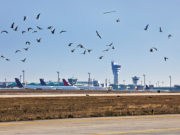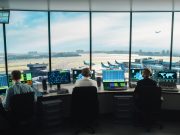With improved data sharing, coordination and situational awareness, commercial space flights eventually will be able to “file-and-fly like any other operator in the airspace,” the Air Line Pilots Association, International (ALPA) says.
ALPA President Capt. Joe DePete told the association’s “Safe Skies for All” conference in Washington on Thursday that the success of both commercial aviation and commercial space operations depends on sharing the airspace. The conference coincided with publication of an ALPA report on the safe integration of commercial space operations into the U.S. National Airspace System.
“ALPA’s vision for the integration of commercial space moves from accommodation of space activities, which we have today, to better interoperability via data exchange, improved coordination and situational awareness in the near- to mid-term,” DePete said.
“ALPA and the aviation industry recognize our responsibility to share the safety lessons we’ve learned so that others don’t have to repeat them,” he added. “We are dedicated to facilitating the safe integration of new and expanding users of the National Airspace System. This commitment applies to all users, including unmanned aircraft systems or drones, hyper- and supersonic flight and, of course, commercial space.”
In the report, ALPA called on the U.S. Federal Aviation Administration and other stakeholders in the National Airspace System to define “full, safe integration” into the airspace “so we can work toward it.” Stakeholders should understand how their operations effect other airspace users and determine the limits of airline operations in accommodating space operations, the report said.
Many of the tools being developed for the FAA’s Next Generation Air Transportation System (NextGen) to enable more efficient air traffic management also will benefit space flights, the report said. The benefits will include improved accuracy and increased frequency in data exchange, upgrades in air traffic control automation, improved surveillance and real-time voice and data communications.
“Looking into the future, the vision for commercial space operations is that they become just another operator in the airspace,” the report said, adding that ALPA and other stakeholders in commercial aviation and commercial space operations should continue discussions with the FAA and others to develop an integration strategy and to identify collaborative solutions.



